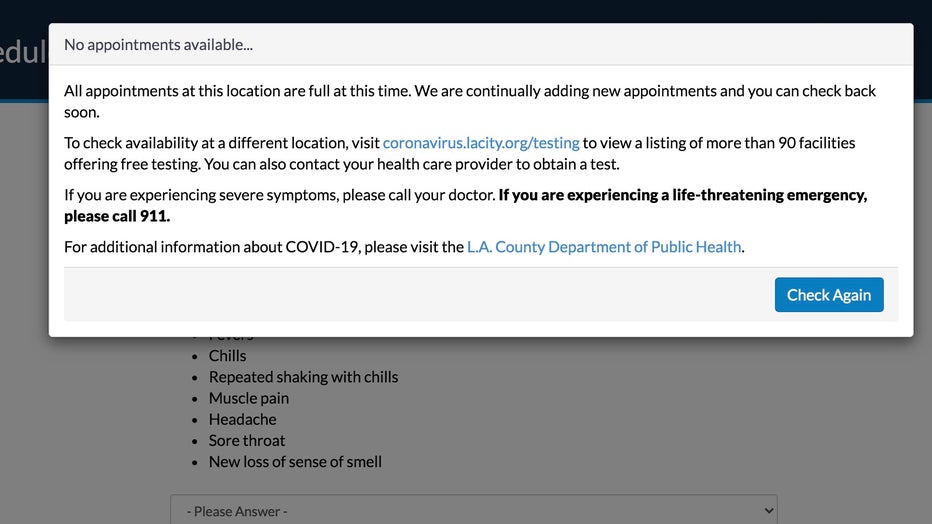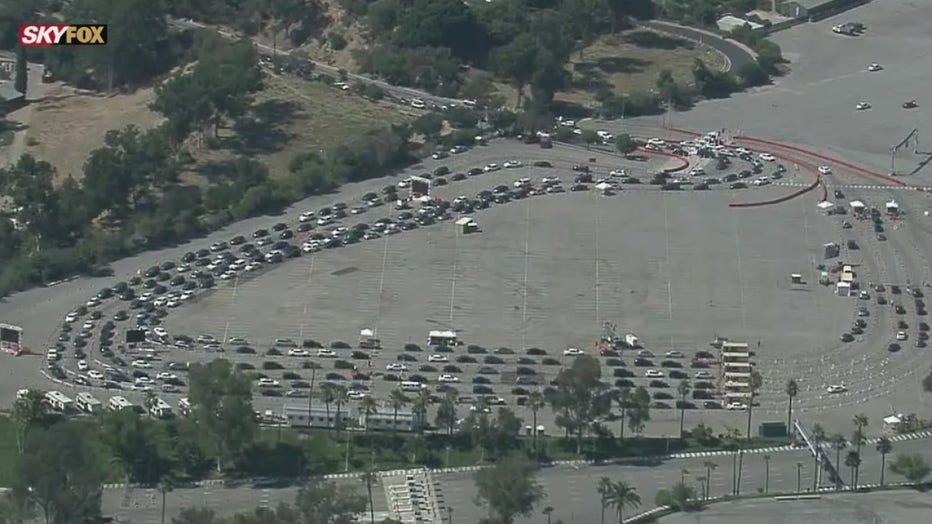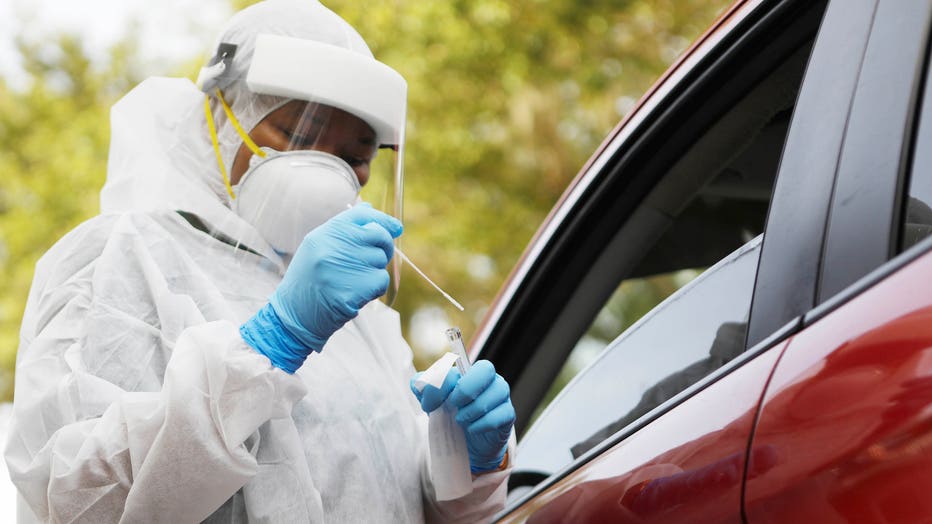'A hot mess': Nationwide trend shows testing delays as coronavirus surges
LOS ANGELES - Southern California residents who log onto the joint Los Angeles County and City COVID-19 website will quickly realize they will be unable to make an appointment due to a lack of availability. Health officials say testing sites are struggling to keep up as more people nationwide seek to find out if they have been infected with the coronavirus.
When logging in Wednesday, a screen will pop up that reads:
"All appointments at this location are full at this time. We are continually adding new appointments and you can check back soon."

Americans have been facing long lines at testing sites and have been waiting for a week or more to get results. Initially, results were available within a day or two.
Health officials also said that testing sites are running out of kits and labs are reporting material shortages.
Those displaying symptoms, aged 65 and older, and those with underlying health conditions are having an easier time getting tested than those who are asymptomatic or want to be tested for peace of mind.
Health officials said that getting a doctor’s order is one of the best ways to go about being tested for the virus as opposed to going to a testing site.
On Tuesday, Sky FOX captured aerial views as Angelenos lined up outside of Dodger Stadium hours before the large testing site even opened. The stadium was temporarily closed over the holiday weekend.

The surge continues to hit the area hard as Los Angeles County health officials reported the highest number of new COVID-19 cases and blaming a backlog error between July 2 and 5.
RELATED: LA County reports highest number of new COVID-19 cases, blames backlog error for large portion
Getting tested and getting results in a timely manner has been a nationwide issue.

A healthcare worker administers a coronavirus test to a patient at the Lee Davis Community Resource Center on June 25, 2020 in Tampa, Florida. (Photo by Octavio Jones/Getty Images)
For two weeks, Rachael Jones has stayed home, going without a paycheck while waiting and waiting for the results of a COVID-19 test from a pharmacy near Philadelphia.
“I’m just so disappointed. I just don’t know how -- with the resources and the people we have and the money we have -- we can’t get this right,” she said.
Four months, 3 million confirmed infections and over 130,000 deaths into the U.S. coronavirus outbreak, Americans confronted with an alarming resurgence of the scourge are facing long lines at testing sites and going a week or more without receiving a diagnosis. Some sites are running out of kits even as testing is ramped up.
RELATED: Stay up to date on all coronavirus-related information
Labs are reporting shortages of materials and don’t have enough workers to process the tests, leading to severe backups that could worsen as economies reopen and new infections emerge.
Scenes of testing sites turning away people and motorists waiting in the summer heat in long lines separated into numerous lanes by traffic cones have left Americans frustrated and wondering why the U.S. can't seem to get its act together, especially after it was given fair warning over the past several months as the virus spread from China to hot spots such as Italy, Spain and New York.
"It’s a hot mess,” said 47-year-old Jennifer Hudson of Tucson, Arizona. “The fact that we’re relying on companies and we don’t have a national response to this, it’s ridiculous. … It’s keeping people who need tests from getting tests."
RELATED: CoronavirusNOW.com, FOX launches national hub for COVID-19 news and updates.
It took Hudson five days to make an appointment through a CVS pharmacy near her home. She managed to book a drive-up test on July 5, more than a week after her symptoms — fatigue, shortness of breath, headache and sore throat — first emerged. The clinic informed her that her results would also probably be delayed.
RELATED: Interactive Map of Coronavirus Cases
The number of tests per day in the U.S. is up to about 640,000 on average, an increase from around 518,000 two weeks ago, according to an Associated Press analysis. Newly confirmed infections per day in the U.S. are running at over 50,000, breaking records at practically every turn.
In an especially alarming indicator, the percentage of tests coming back positive for the virus is on the rise across nearly the entire country, hitting almost 27% in Arizona, 19% in Florida and 17% in South Carolina.
As more people are tested, an increase in the raw number of positive tests is to be expected. But if the virus is being brought under control, then the percentage of positive results relative to the total number of tests should be coming down.
In other developments:
— While the number of confirmed cases in the U.S. hit 3 million Wednesday according to the count kept by Johns Hopkins University, health officials have said that because of inadequate testing and the many mild cases that have gone unreported or unrecognized, the real number of infections is about 10 times higher. That would amount to almost 10% of the U.S. population.
— Most New York City students will return to school in the fall two or three days a week and learn online the rest of the time under a plan announced Mayor Bill de Blasio. He said schools can’t accommodate all their students at any one time and maintain social distancing. The school system in New York is by far the biggest in the nation, with 1.1 million students. It has been closed since March.
The U.S. Department of Health and Human Services this week said it will open free “surge testing” sites in three cities that are seeing significant increases in cases and hospitalizations — Jacksonville, Florida; Baton Rouge, Louisiana; and Edinburg, Texas. Each site will be able to conduct as many as 5,000 tests a day, with results coming back in three to five days, officials said.
In Georgia, one of the states where cases are surging, officials are rushing to expand testing capacity as demand rises sharply and threatens to overwhelm six major sites around Atlanta, said DeKalb County CEO Michael Thurmond.
"If you project this out over the next three weeks, we can’t handle it," he said.
New Orleans residents on Wednesday were turned away from a free testing site for a third consecutive day after it reached its daily allotment of tests. Health care providers are running low on trays and chemicals needed to run machines used in the tests.
“There are still supply chain issues with getting these products from China and other places,” said the city’s health director, Dr. Jennifer Avegno.
Tests are still being done at a daily rate well above the number needed to meet federal standards for a community the size of New Orleans, she said. But Avegno said she fears that the progress New Orleans — an early hot spot in the outbreak — made in flattening its curve could be reversed.
Jon DiMuzio underwent a test 10 days ago at a walk-up site in Fort Lauderdale, Florida, ahead of a planned July Fourth trip to see his family in Philadelphia. He ended up canceling the visit because the results didn’t come in time and he didn’t want to put his relatives at risk.
He still had not received a diagnosis on Tuesday.
"Last Wednesday, they told me I should know by Friday or Saturday," DiMuzio said. "Yesterday, they said, ‘You should know today or tomorrow,’ and they said the same thing today"
Residents of minority communities say there is a severe shortage of testing in their neighborhoods, far from middle-class areas where most chain pharmacies and urgent care clinics offering tests are found. In Arizona hundreds of people lined up last week for a large-scale testing event in a low-income area of Phoenix that is heavily Hispanic and Black.
North Carolina now will allow residents to undergo coronavirus testing without a doctor’s referral, a move made to encourage more Black, Hispanic and Native American residents to get tested. The state is also creating of up to 300 free temporary testing sites throughout July.
Testing delays forced baseball’s defending champion Washington Nationals and reigning American League champion Houston Astros to call off training camp practices on Monday after the teams didn’t receive test results from Friday.
Patrick Friday, a United Methodist minister in Alabama, went to several hospitals and clinics in Birmingham this week to get checked after his middle-school-age son tested positive for the virus. But he was told that unless he had a preexisting condition, he didn’t qualify.
Finally, through word of mouth, he ended up at a site offering rapid-result tests. His negative result came back quickly, but he found the experience frustrating.
"We are several months into this. How can it be that we can’t go in and get a test?” he asked Tuesday. “At this point it seems like we have a lot of gaps that need to be closed in a hurry."
FOX 11's Kelli Johnson and Sandra Endro contributed to this report. Tulp reported from Leawood, Kansas. Associated Press reporters from around the world contributed to this report.

